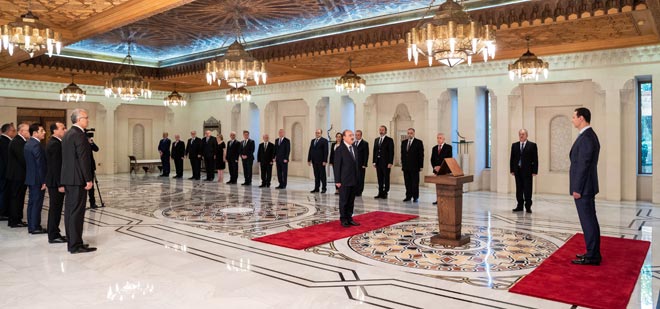Members of the new cabinet of Syria, chaired by Prime Minister Hussein Arnous, were sworn in before President Bashar al-Assad on Saturday. Later, President Assad chaired a meeting for the Cabinet in which he affirmed that the economy, production, and securing job opportunities in Syria were the new government’s top priorities. The President emphasized the complexity of the situation and the many challenges that this new government will be up to.
President Assad added that while priority was previously given to security in Syria, today, it is challenges linked to the economy, especially production and the job market, that top the agenda of the Syrian cabinet. In fact, the economy is seen by president Assad and the new cabinet as essential for continuous stability especially after liberating the majority of Syria from terrorism.
Challenges
President Assad said that the most significant point as a government is to define existing challenges and specify which of them are principal or secondary. Sometimes, it is easy to plunge into secondary challenges and ignore the main ones.
It is also important to identify what challenges can be resolved in the current circumstances, and which ones cannot. “I talk about the internal circumstances, which are the general ones inside the homeland and its institutions, including weakness, corruption, dysfunction, etc…,” the president said.
President Bashar al-Assad added “when we see accurately, we can convey our vision to the citizens and at that point, the general vision in Syria will be clear and our dialogue will be objective. Then, criticism and discussion will be immune from external propaganda that tries to turn the citizen into an enemy to the state and to the homeland.”
President Assad added that partnership is so fundamental for the success of the government, and “we have to expand partnership as far as possible with the popular initiatives, agencies, and specialists, as broadening partnership means more ideas and fewer mistakes,” stressing that decentralization achieves balanced development between the richest and poorest regions and between the city and the countryside.
Read Also: Assad issues Decree on Forming the New Syrian Government
“Here comes the role of the local Administration… the local councils are most capable to recognize their local interests and propose solutions, and this helps the central authority and the official to distance from plunging in details and goes into the compass of strategic thinking, monitoring and setting plans etc… of the basic tasks he or she must fulfill… at the same time decentralization achieves balanced development between the richest and poorest regions,” the President said.
President Assad went on to say that although challenges are many, the priority is now given to the livelihood challenge. The subsidies policy has been exited for more than five decades, supporting citizens in their basic needs, and this has not changed. But, the strategy and mechanisms are changing according to the circumstances, we have the policy of offering subsidies to the peasant, supporting the agrarian crops, and the public sector, among others.
As for the investment law, President Assad said that the law was issued several months ago, and “the echo was positive among investors, but as all know, the executive instructions of the law were not issued… the executive instructions are the formula, it is the basis of success for any law.”
“There are the procedures… facilitating and simplifying procedures in other institutions which are not included in the investment law itself, the banking and financial policies, the funding and the customs… so I believe that the most important point is to speed up the development of electronic services regarding the investment environment,” President Assad said.
Corruption
Regarding corruption, the President said, “We can talk in details about the retreat of ethics that led to the spread of corruption and this is right, but the State won’t wait for the improvement of ethics in order to combat corruption… we have to put criterion, regulations and clear mechanisms to help control corruption, of course, I don’t talk about all citizens, but only about those who are corrupt.”
Read Also: Supreme Investment Council: Instructions for New Investment Law
“It is not possible to find a financial reform without a tax reform, therefore, our success in dealing or developing the tax system and improving the level of institutions and raising the performance of cadres, and when we can actually combat tax evasion, and it is a big gap in the Syrian economy, the State will gain large amounts of money and be able to offer best services for the citizens,” President Assad affirmed.
As for the alternative energy, the President said that the circumstances Syria is passing through regarding electricity and oil derivatives push the people to adopt the alternative energy and this is a good thing, but as this sector is new for the country, so it doesn’t subjugate to any policy or regulations, and “ I believe the urgent challenge now is to have a policy and regulation for this sector, otherwise there will be an exploitation by some greedy merchants who exploit the need of people for the energy.”
Regarding media, President Assad said that in addition to its traditional task, the media should combat the global defamation campaign launched against Syria.
“The second point is that the role of media is to be a bridge between the citizen and the official, and if the media has not intervened in proposing solutions, it wouldn’t find a position among citizens,” President Assad said.
This article was edited by The Syrian Observer. The Syrian Observer has not verified the content of this story. Responsibility for the information and views set out in this article lies entirely with the author.


